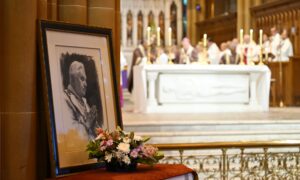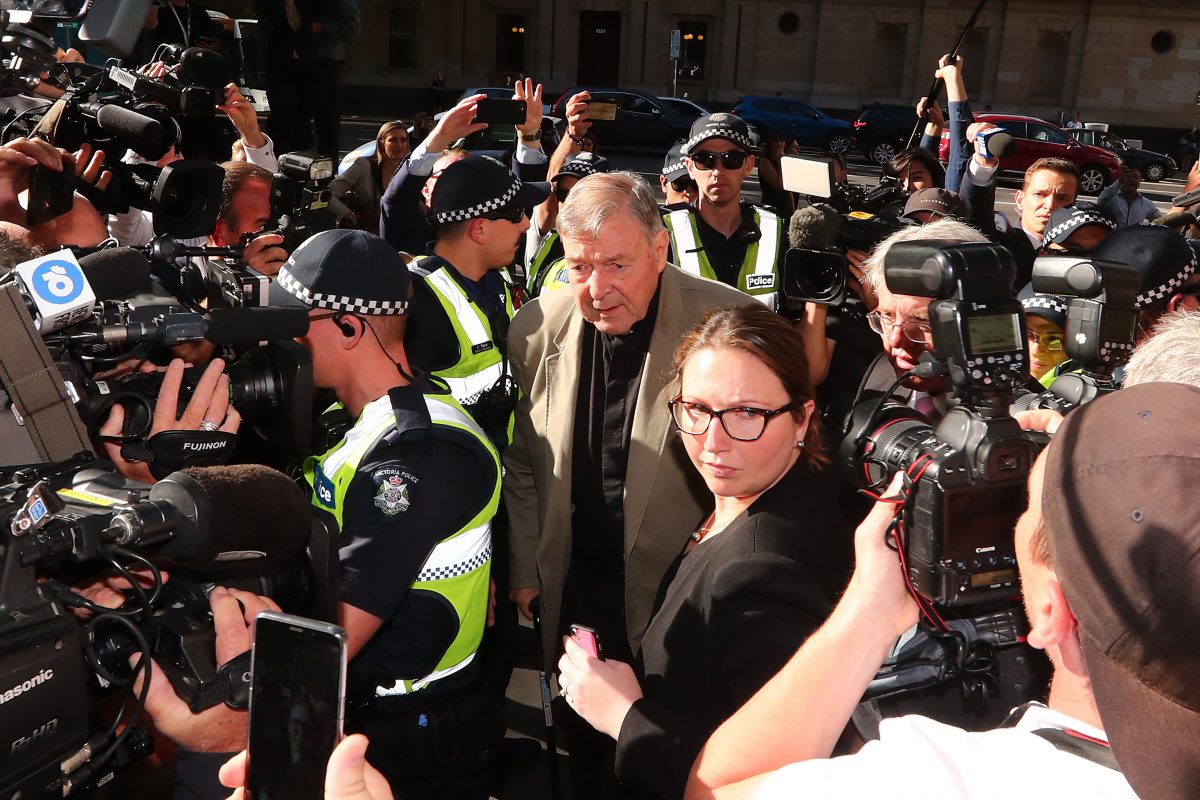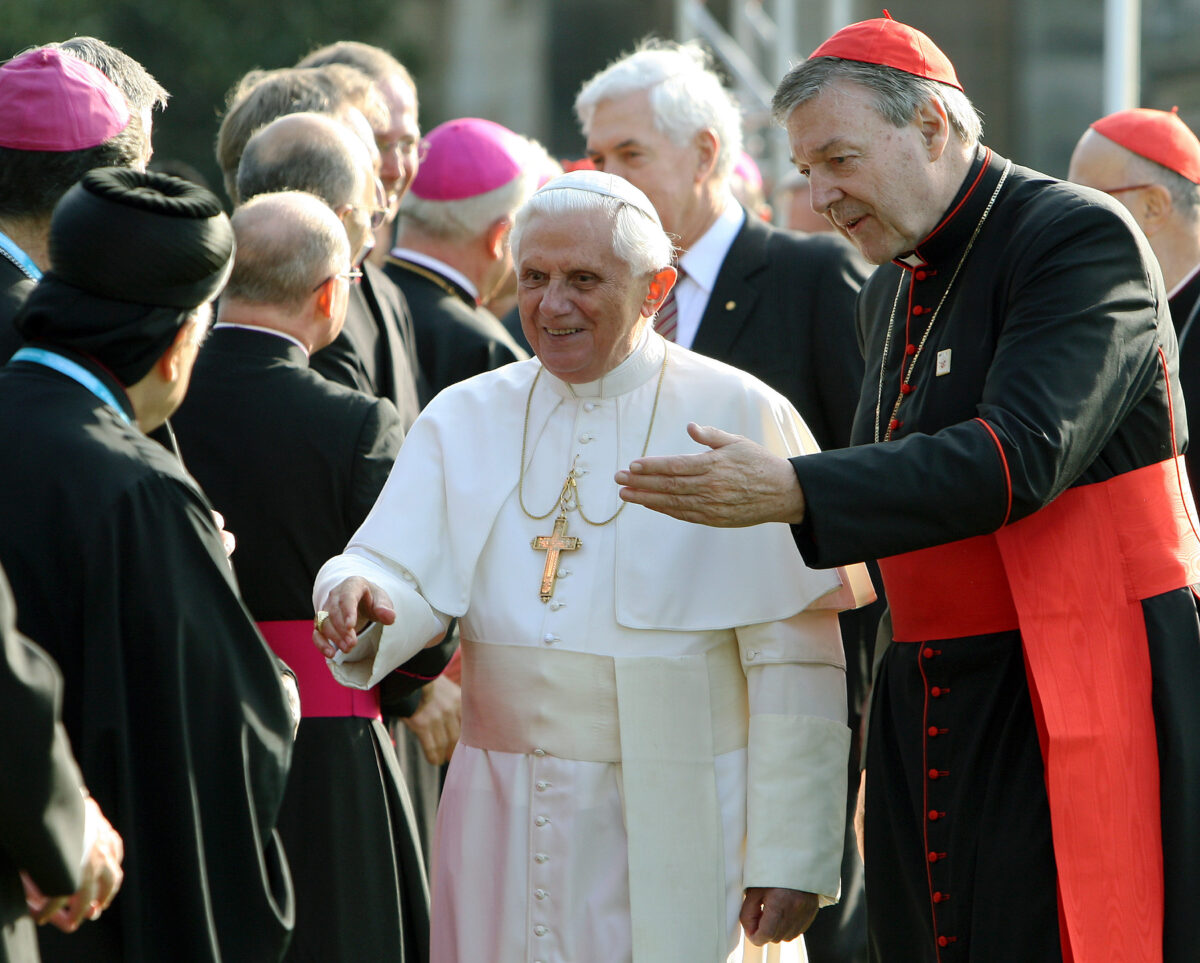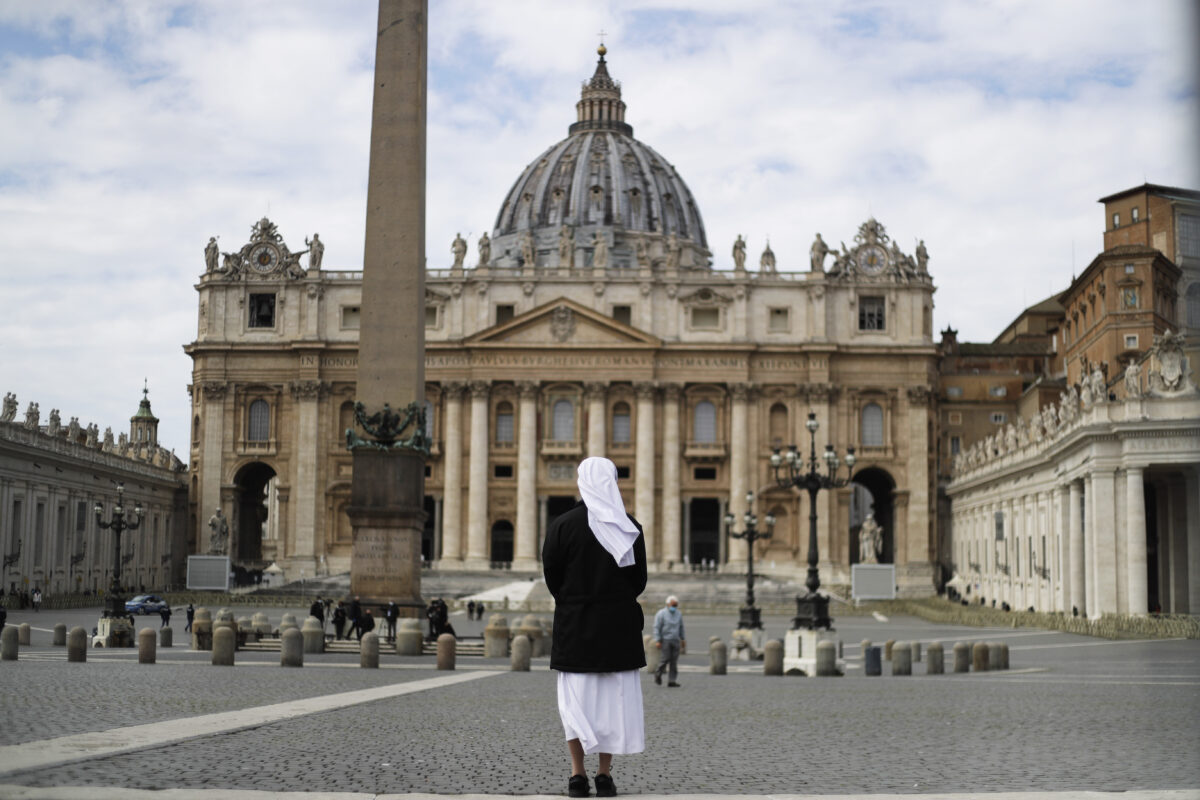Cardinal George Pell: A Lifetime of Achievements
CommentaryGiven that permanent European settlement in Australia dates back just some 235 years, this country has had more than its fair share of extraordinary Catholics. Of course, we have St Mary of the Cross, better known as Mary MacKillop. As far as churchmen go, three giants spring to mind: the English Benedictine, Bede Polding, who was the first Archbishop of Sydney. Bishop Rosendo Salvado, the Spanish Benedictine who established the famous New Norcia Abbey and mission to Aboriginal people in remote Western Australia in the most difficult conditions. And finally, Archbishop Daniel Mannix, the Irish-born Archbishop of Melbourne for a record 46 years, whose steadfast support of prominent Catholic lawyer BA Santamaria against Communist influence in the Labor Party led to the split of 1955 and the creation of the Democratic Labor Party. However, Cardinal George Pell, who died on Jan. 11 at age 81, was probably the finest cleric this country has produced. Many have written on his trial, conviction and subsequent quashing of that conviction (seven-to-zero in the High Court of Australia) for child sexual offences. I do not intend to dwell on that terrible episode in Australia’s judicial history; suffice to say that, despite spending 405 days in prison for a crime he did not commit, it only strengthened Cardinal Pell’s faith. Cardinal George Pell arrives at Melbourne County Court in Melbourne, Australia, on Feb. 27, 2019. (Michael Dodge/Getty Images) In his Prison Journal, he wrote, quoting from the great Spanish saint, Teresa of Ávila: May nothing disturb you, nothing frighten you.All things pass, God does not change;Patience can cope with anything.One who has God lacks nothingGod alone is enough. Great Highlights of Pell’s Life Cardinal Pell’s achievements are extraordinary, and he played a pivotal role in the life of the Church, both in Australia and internationally. Below is a summation of just some. At the age of 45, he was consecrated as an auxiliary bishop for the Archdiocese of Melbourne, in St Patrick’s Cathedral on May 21, 1987. Shortly after, he was elected to chair Australian Catholic Relief—the Church’s overseas aid agency. During his tenure, among other achievements, he worked extensively in Cambodia as it was rebuilt from the rubble of Pol Pot’s Killing Fields and took active roles in Zambia, Thailand, Vietnam, Indonesia and the Philippines. As Tess Livingstone wrote in The Australian, the distribution of aid from Australian Catholics needed extensive reform in the Philippines after the infiltration of local agencies by political operatives with Communist agendas. Pell made many visits to China to give assistance to the persecuted underground Church loyal to the Vatican, as well as visiting many in the “Patriotic Association” who wanted to cooperate with Rome. The Vatican’s current agreement with the Chinese Communist Party, which oversees the appointment of bishops in China, entered into and renewed by Pope Francis last year, apparently caused Cardinal Pell great distress. At age 49, Pell received “the biggest surprise of my life”—an appointment by Pope John Paul II to the Congregation for the Doctrine of the Faith—the Church’s main body defending faith and morals, then led by Cardinal Joseph Ratzinger (later Pope Benedict XVI). Pell was the first Australian to be so appointed and served on the Congregation until 2000. He later served on numerous other Vatican bodies, including the Congregation for Divine Worship and the Discipline of the Sacraments. In 1996, he was appointed Archbishop of Melbourne, announcing that he stood “foursquare with the teachings of the Church’s Magisterium” and thus set about a reform of seminary and faith education. Building up priestly vocations was a priority. Moreover, within weeks of his appointment, he established one of the first formal church processes in the world for dealing with child sexual abuse. The Melbourne Response, as it became known, headed by an independent Queen’s Counsel, was then used as a template by all Australian dioceses, and many around the world, to deal with allegations of sexual abuse against clergy. After five years as Archbishop of Melbourne, in 2001, Pell was made Archbishop of Sydney by Pope John Paul II, and created a Cardinal two years later. As in Melbourne, faith education, establishing university chaplaincies, seminary reform, and building up vocations to the priesthood were his priorities. For 13 years, his weekly column in Sydney’s Sunday Telegraph newspaper drew a vast readership. The undoubted highlight of his time in Sydney occurred in 2008, when as part of World Youth Day, 500,000 young people aged 16 to 30 from 200 countries converged on Sydney, with hundreds of thousands more from around Australia, for a Saturday night vigil and Sunday Mass with Pope Benedict XVI at Randwick Racecourse. The young pilgrims were accompanied by 600 bishops and cardinals, and the event was covered by 6,000 journalis

Commentary
Given that permanent European settlement in Australia dates back just some 235 years, this country has had more than its fair share of extraordinary Catholics. Of course, we have St Mary of the Cross, better known as Mary MacKillop.
As far as churchmen go, three giants spring to mind: the English Benedictine, Bede Polding, who was the first Archbishop of Sydney.
Bishop Rosendo Salvado, the Spanish Benedictine who established the famous New Norcia Abbey and mission to Aboriginal people in remote Western Australia in the most difficult conditions.
And finally, Archbishop Daniel Mannix, the Irish-born Archbishop of Melbourne for a record 46 years, whose steadfast support of prominent Catholic lawyer BA Santamaria against Communist influence in the Labor Party led to the split of 1955 and the creation of the Democratic Labor Party.
However, Cardinal George Pell, who died on Jan. 11 at age 81, was probably the finest cleric this country has produced.
Many have written on his trial, conviction and subsequent quashing of that conviction (seven-to-zero in the High Court of Australia) for child sexual offences.
I do not intend to dwell on that terrible episode in Australia’s judicial history; suffice to say that, despite spending 405 days in prison for a crime he did not commit, it only strengthened Cardinal Pell’s faith.

In his Prison Journal, he wrote, quoting from the great Spanish saint, Teresa of Ávila:
May nothing disturb you, nothing frighten you.
All things pass, God does not change;
Patience can cope with anything.
One who has God lacks nothing
God alone is enough.
Great Highlights of Pell’s Life
Cardinal Pell’s achievements are extraordinary, and he played a pivotal role in the life of the Church, both in Australia and internationally. Below is a summation of just some.
At the age of 45, he was consecrated as an auxiliary bishop for the Archdiocese of Melbourne, in St Patrick’s Cathedral on May 21, 1987.
Shortly after, he was elected to chair Australian Catholic Relief—the Church’s overseas aid agency. During his tenure, among other achievements, he worked extensively in Cambodia as it was rebuilt from the rubble of Pol Pot’s Killing Fields and took active roles in Zambia, Thailand, Vietnam, Indonesia and the Philippines.
As Tess Livingstone wrote in The Australian, the distribution of aid from Australian Catholics needed extensive reform in the Philippines after the infiltration of local agencies by political operatives with Communist agendas.
Pell made many visits to China to give assistance to the persecuted underground Church loyal to the Vatican, as well as visiting many in the “Patriotic Association” who wanted to cooperate with Rome.
The Vatican’s current agreement with the Chinese Communist Party, which oversees the appointment of bishops in China, entered into and renewed by Pope Francis last year, apparently caused Cardinal Pell great distress.
At age 49, Pell received “the biggest surprise of my life”—an appointment by Pope John Paul II to the Congregation for the Doctrine of the Faith—the Church’s main body defending faith and morals, then led by Cardinal Joseph Ratzinger (later Pope Benedict XVI).
Pell was the first Australian to be so appointed and served on the Congregation until 2000. He later served on numerous other Vatican bodies, including the Congregation for Divine Worship and the Discipline of the Sacraments.
In 1996, he was appointed Archbishop of Melbourne, announcing that he stood “foursquare with the teachings of the Church’s Magisterium” and thus set about a reform of seminary and faith education. Building up priestly vocations was a priority.
Moreover, within weeks of his appointment, he established one of the first formal church processes in the world for dealing with child sexual abuse.
The Melbourne Response, as it became known, headed by an independent Queen’s Counsel, was then used as a template by all Australian dioceses, and many around the world, to deal with allegations of sexual abuse against clergy.
After five years as Archbishop of Melbourne, in 2001, Pell was made Archbishop of Sydney by Pope John Paul II, and created a Cardinal two years later. As in Melbourne, faith education, establishing university chaplaincies, seminary reform, and building up vocations to the priesthood were his priorities.
For 13 years, his weekly column in Sydney’s Sunday Telegraph newspaper drew a vast readership.
The undoubted highlight of his time in Sydney occurred in 2008, when as part of World Youth Day, 500,000 young people aged 16 to 30 from 200 countries converged on Sydney, with hundreds of thousands more from around Australia, for a Saturday night vigil and Sunday Mass with Pope Benedict XVI at Randwick Racecourse.
The young pilgrims were accompanied by 600 bishops and cardinals, and the event was covered by 6,000 journalists.

Another international achievement of Pell during this period was his nine years chairing the Vox Clara (Clear Voice) committee to oversee a new English translation of the Mass.
From both a worship and a translation point of view, the English translation of the 1969 missal (the Novus Ordo) was riddled with poor paraphrasing, and jarred.
“In praying to the omnipotent God at Mass,” Pell told The Australian at the time, “it is not appropriate to talk in the same way we do at a barbecue.”
The final Mass texts produced by Vox Clara were approved in 2011 and since then have been in use across the English-speaking world.
Work in the Vatican
At the time of his arrest on the child sexual abuse charges, Pell was serving as prefect for the Economy in Rome, essentially the Vatican treasurer, after being appointed by Pope Francis in 2014 to clean up the Vatican’s financial affairs. But, as Tess Livingstone reported in The Australian, the mess he uncovered was unbelievable.

On his watch, 4,000 Vatican Bank accounts of individuals and organisations not entitled to them were closed; 200 were referred to authorities on suspicion of money laundering.
Prosecutions were launched, and scandals uncovered, such as that involving the former Vatican Secretary of State, Cardinal Tarcisio Bertone, who reportedly transferred 15 million Euros (US$20 million) from the Vatican Bank to a private film company and used $300,000 from a fund for sick children to rebuild his lavish apartment.
All throughout, he was obstructed in his efforts by Vatican Archbishop Angelo Becciu, the deputy to Secretary of State Cardinal Parolin (who oversaw the aforementioned Vatican agreement with Beijing), who suspended an external audit by PricewaterhouseCoopers. The firm had been engaged by Pell to improve the transparency of Vatican finances to international anti-money-laundering standards.
Becciu is now the subject of the “trial of the century” involving cases of alleged financial wrongdoing in the Vatican.
Cardinal Pell did express a desire to those close to him to return to Australia, given his health issues. However, he wanted to stay in Rome, knowing his good friend, Pope Emeritus Benedict XVI, was not well. Indeed, Pell attended the late Pope’s funeral.
Cardinal Pell’s life was emblematic of Jesus’s words in St John’s Gospel (10:10): “I have come that you may have life, and have it to the full.”
Requiescat in pace.
Views expressed in this article are the opinions of the author and do not necessarily reflect the views of The Epoch Times.












